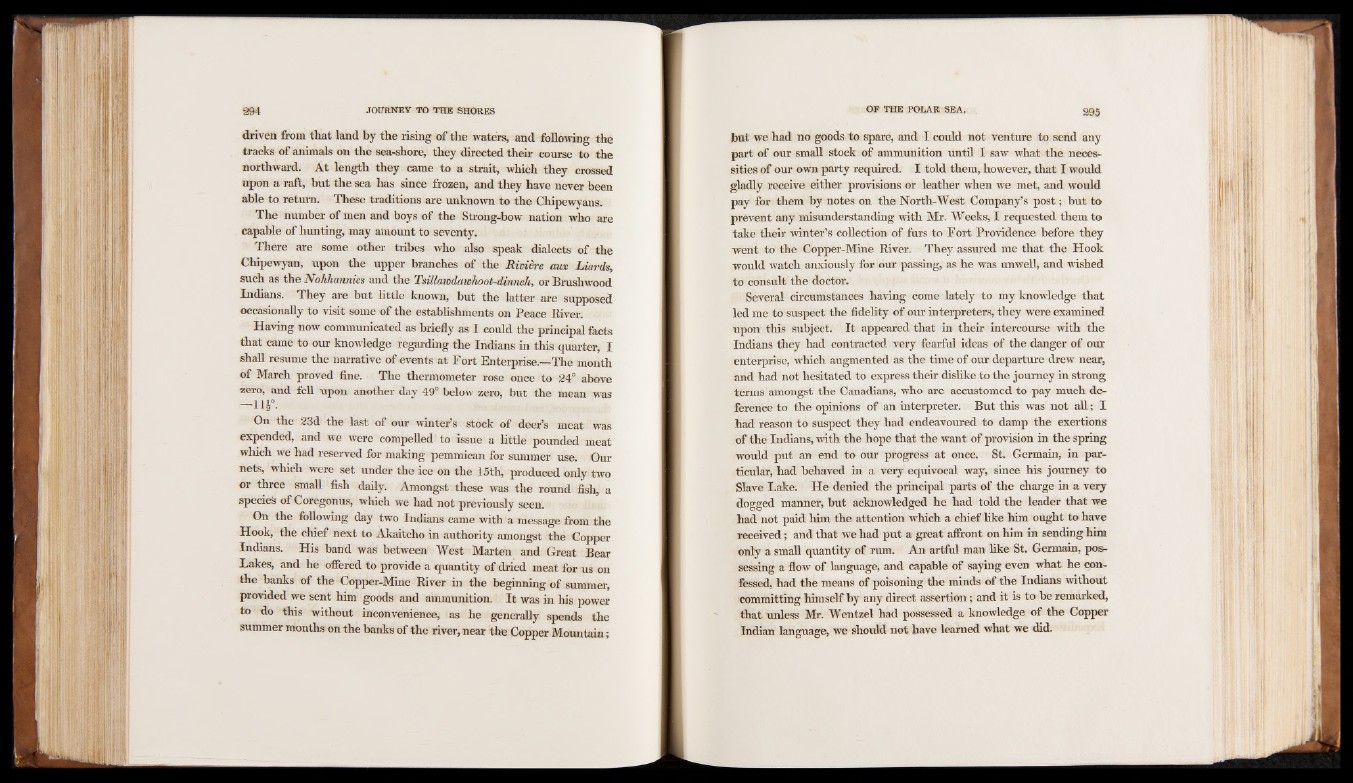
driven from that land by the rising of the waters, and following the
tracks of animals on the seashore, they directed their course to the
northward. At length they came to a strait, which they crossed
upon a raft, but the sea has since frozen, and they have never been
able to return. These traditions are unknown to the Chipewyans.
The number of men and boys of the Strong-bow nation who are
capable of hunting, may amount to seventy.
There are some other tribes who also speak dialects of the
Chipewyan, upon the upper branches of the Rivière aux Liards,
such as the Nohhannies and the Tsiilatodawhoot-dinneh, or Brushwood
Indians. They are but little known, but the latter are supposed
occasionally to visit some of the establishments on Peace Eiver.
Having now communicated as briefly as I could the principal facts
that came to our knowledge regarding the Indians in this quarter, I
shall resume the narrative of events at Fort Enterprise.—The month
of March proved fine. The thermometer rose once to -24° above
zero, and fell upon another day 49° below -nr. zero, but the mean was On the 23d the last of our winter’s stock of deer’s meat was
expended, and we were compelled to issue a little pounded meat
which we had reserved for making pemmican for summer use. Our
nets, which were set under the ice on the 15 th, produced only two
or three small fish daily. Amongst these was the round fish, a
specie^ of Coregonus, which we had not previously seen.
On the following day two Indians came with a message from the
Hook, the chief next to Akaitcho in authority amongst the Copper
Indians. His band was between West Marten and Great Bear
Lakes, and he offered to provide a quantity of dried meat for us on
the banks of the Copper-Mine River in the beginning of summer,
provided we sent him goods and ammunition. It was in his power
to do this without inconvenience, as he generally spends the
summer months on the banks of the river, near the Copper Mountain ;
but we had no goods to spare, and I could not venture to send any
part of our small stock of ammunition until I saw what the necessities
of our own party required. I told them, however, that I would
gladly receive either provisions or leather when we met, and would
pay for them by notes on the North-West Company’s post; but to
prevent any misunderstanding with Mr. Weeks, I requested them to
take their winter’s collection of furs to Fort Providence before they
went to the Copper-Mine River. They assured me that the Hook
would watch anxiously for our passing, as he was unwell, and wished
to consult the doctor.
Several circumstances having come lately to my knowledge that
led me to suspect the fidelity of our interpreters, they were examined
upon this subject. It appeared that in their intercourse with the
Indians they had contracted very fearful ideas of the danger of aur
enterprise, which augmented as the time of our departure drew near,
and had not hesitated to express their dislike to the journey in strong
terms amongst the Canadians, who are accustomed to pay much deference
to the opinions of an interpreter. But this was not all; I
had reason to suspect they had endeavoured to damp the exertions
of the Indians, with the hope that the want of provision in the spring
would put an end to our progress at once. St. Germain, in particular,
had behaved in a very equivocal way, since his journey to
Slave Lake. H e denied the principal parts of the charge in a very
dogged manner, but acknowledged he had told the leader that we
had not paid him the attention which a chief like him ought to have
received; and that we had put a great affront on him in sending him
only a small quantity of rum. An artful man like St. Germain, possessing
a flow of language, and capable of saying even what he confessed,
had the means of poisoning the minds of the Indians without
committing himself by any direct assertion; and it is to be remarked,
that unless Mr. Wentzel had possessed a knowledge of the Copper
Indian language, we should not have learned what we did.